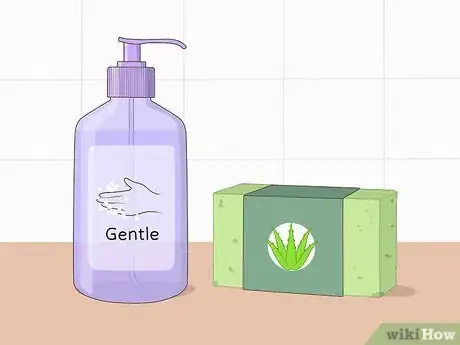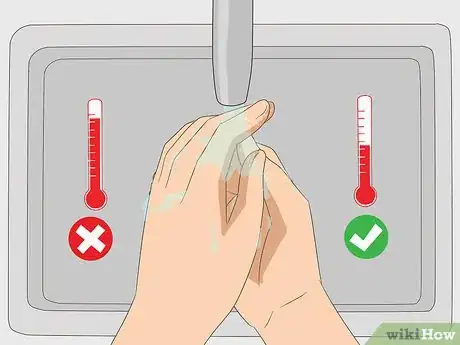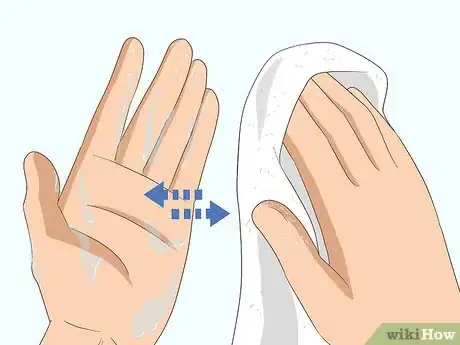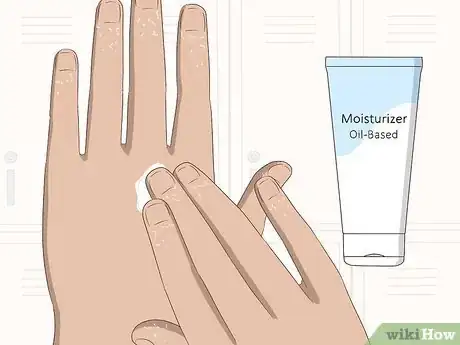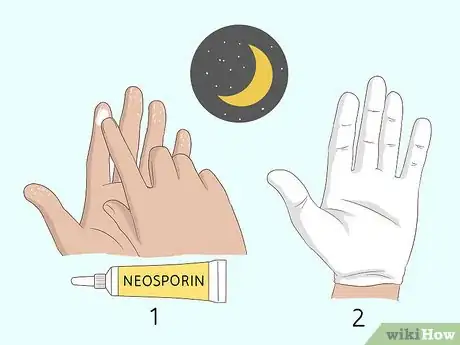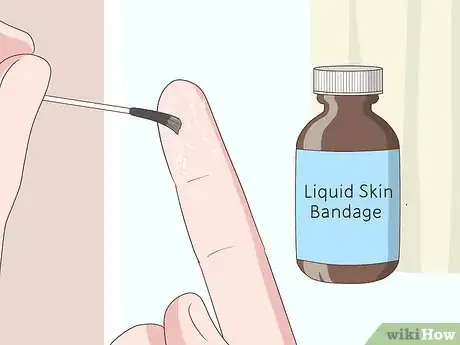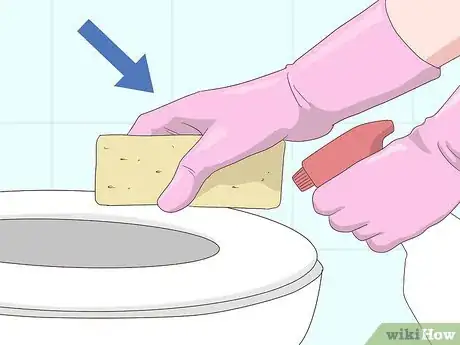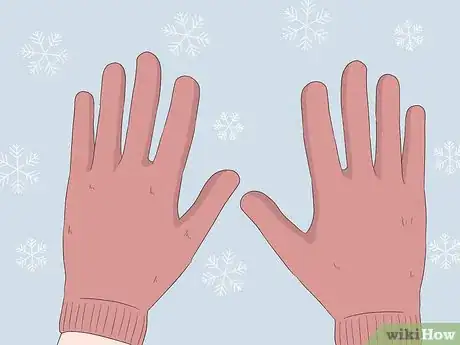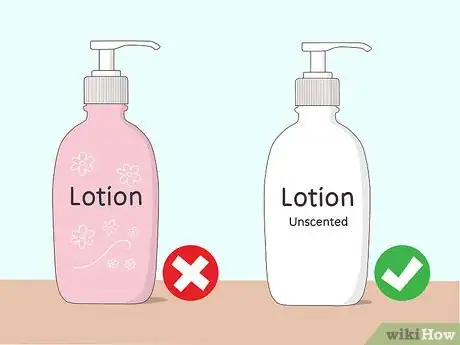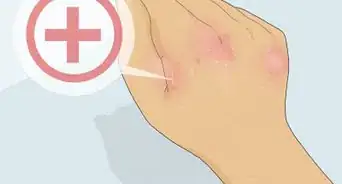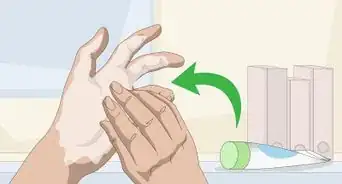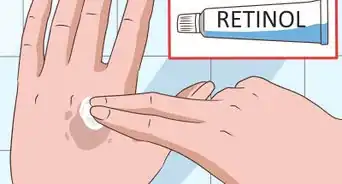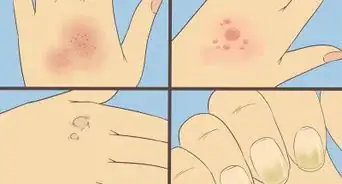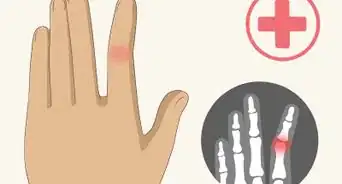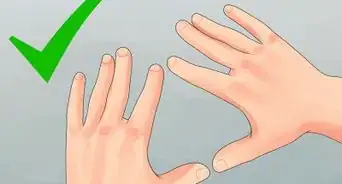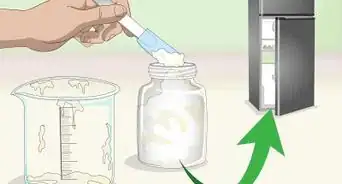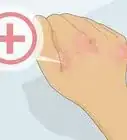This article was medically reviewed by R. Sonia Batra, MD, MSc, MPH and by wikiHow staff writer, Jennifer Mueller, JD. Dr. R. Sonia Batra is a board certified Dermatologist and the Founder of Batra Dermatology based in Los Angeles, California. With over 15 years of experience, Dr. Batra specializes in lasers, medical devices, patient and public medical education, and skin cancer research. She received her Bachelor’s degree, Master’s degree in Public Health, and her Doctor of Medicine (MD) degrees from Harvard University. As a Rhodes Scholar, she earned a Master’s degree in Molecular Genetics at the University of Oxford. She completed her residency training in Dermatology at Stanford University. Dr. Batra has contributed and reviewed for the Journal of Dermatologic Surgery, the Journal of the American Academy of Dermatology, and JAMA Dermatology. She is also a co-host of CBS’ Emmy award-winning television show, The Doctors.
There are 7 references cited in this article, which can be found at the bottom of the page.
wikiHow marks an article as reader-approved once it receives enough positive feedback. This article received 17 testimonials and 100% of readers who voted found it helpful, earning it our reader-approved status.
This article has been viewed 1,699,903 times.
Dry, cracked skin on your fingers makes it really painful to use your hands to complete everyday activities. Fortunately, you can typically heal your cracked skin at home without needing any significant medical assistance. Although it may take some time, with proper care your skin can become soft and smooth again. Continuing to protect your skin after it's healed can keep the condition from returning.[1]
Steps
Expert Q&A
Did you know you can get premium answers for this article?
Unlock premium answers by supporting wikiHow
-
QuestionWhat should I do for hands that are cracking?
 Luba Lee, FNP-BC, MSLuba Lee, FNP-BC is a Board-Certified Family Nurse Practitioner (FNP) and educator in Tennessee with over a decade of clinical experience. Luba has certifications in Pediatric Advanced Life Support (PALS), Emergency Medicine, Advanced Cardiac Life Support (ACLS), Team Building, and Critical Care Nursing. She received her Master of Science in Nursing (MSN) from the University of Tennessee in 2006.
Luba Lee, FNP-BC, MSLuba Lee, FNP-BC is a Board-Certified Family Nurse Practitioner (FNP) and educator in Tennessee with over a decade of clinical experience. Luba has certifications in Pediatric Advanced Life Support (PALS), Emergency Medicine, Advanced Cardiac Life Support (ACLS), Team Building, and Critical Care Nursing. She received her Master of Science in Nursing (MSN) from the University of Tennessee in 2006.
Board-Certified Family Nurse Practitioner
-
QuestionWhat foods are helpful for healing cracked skin?
 Luba Lee, FNP-BC, MSLuba Lee, FNP-BC is a Board-Certified Family Nurse Practitioner (FNP) and educator in Tennessee with over a decade of clinical experience. Luba has certifications in Pediatric Advanced Life Support (PALS), Emergency Medicine, Advanced Cardiac Life Support (ACLS), Team Building, and Critical Care Nursing. She received her Master of Science in Nursing (MSN) from the University of Tennessee in 2006.
Luba Lee, FNP-BC, MSLuba Lee, FNP-BC is a Board-Certified Family Nurse Practitioner (FNP) and educator in Tennessee with over a decade of clinical experience. Luba has certifications in Pediatric Advanced Life Support (PALS), Emergency Medicine, Advanced Cardiac Life Support (ACLS), Team Building, and Critical Care Nursing. She received her Master of Science in Nursing (MSN) from the University of Tennessee in 2006.
Board-Certified Family Nurse Practitioner
Things You'll Need
- Mild fragrance-free soap
- Moisturizing cream
- Petroleum jelly
- Lined rubber gloves
- Light cotton gloves
- Warm winter gloves
- Non-fragranced detergent
References
- ↑ https://newsnetwork.mayoclinic.org/discussion/home-remedies-dealing-with-dry-skin/
- ↑ https://newsnetwork.mayoclinic.org/discussion/home-remedies-dealing-with-dry-skin/
- ↑ https://www.ncbi.nlm.nih.gov/books/NBK144008/
- ↑ R. Sonia Batra, MD, MSc, MPH. Board Certified Dermatologist. Expert Interview. 14 May 2021.
- ↑ https://newsnetwork.mayoclinic.org/discussion/home-remedies-dealing-with-dry-skin/
- ↑ https://newsnetwork.mayoclinic.org/discussion/home-remedies-dealing-with-dry-skin/
- ↑ https://newsnetwork.mayoclinic.org/discussion/home-remedies-dealing-with-dry-skin/
- ↑ R. Sonia Batra, MD, MSc, MPH. Board Certified Dermatologist. Expert Interview. 14 May 2021.
- ↑ https://newsnetwork.mayoclinic.org/discussion/home-remedies-dealing-with-dry-skin/
- ↑ R. Sonia Batra, MD, MSc, MPH. Board Certified Dermatologist. Expert Interview. 14 May 2021.
- ↑ https://www.mayoclinic.org/diseases-conditions/dry-skin/expert-answers/cracked-thumb-tip/faq-20450998
- ↑ R. Sonia Batra, MD, MSc, MPH. Board Certified Dermatologist. Expert Interview. 14 May 2021.
- ↑ https://www.seattlechildrens.org/conditions/a-z/cracked-or-dry-skin/
- ↑ http://www.bad.org.uk/for-the-public/patient-information-leaflets/hand-dermatitis/?showmore=1&returnlink=http%3A%2F%2Fwww.bad.org.uk%2Ffor-the-public%2Fpatient-information-leaflets#
- ↑ https://newsnetwork.mayoclinic.org/discussion/home-remedies-dealing-with-dry-skin/
- ↑ https://www.ncbi.nlm.nih.gov/books/NBK144008/
- ↑ https://www.aad.org/public/diseases/eczema/hand-eczema
- ↑ https://newsnetwork.mayoclinic.org/discussion/home-remedies-dealing-with-dry-skin/
- ↑ https://newsnetwork.mayoclinic.org/discussion/home-remedies-dealing-with-dry-skin/
About This Article
To heal the cracked skin on your fingers, keep your skin moisturized when you wash your hands by switching to a liquid soap for sensitive skin. Avoid bar soaps unless they have soothing ingredients like aloe or oatmeal, since they’re more likely to dry out your skin. When you shower, limit yourself to only 5 or 10 minutes, because the hot water will strip away oils that naturally moisturize your skin. For extra healing power, apply a fragrance-free oil or cream moisturizer after drying your hands to lock in your natural oils. Be sure to dab the moisturizer in instead of rubbing, which can make any peeling or cracking worse. For more tips from our Medical co-author, including how to protect your skin from harsh environments, scroll down.
